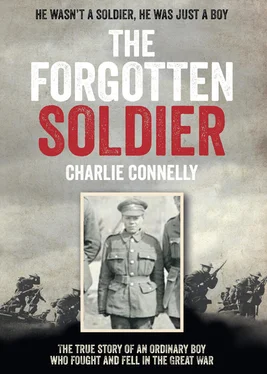The training and drilling sessions always commenced with a hymn, the highly appropriate “Fight the Good Fight”, with the curate and captain of the lads’ company Reverend Bates at the harmonium.
‘He was over 6’3” and sat at this little harmonium pedalling away, looking as if his knees were under his chin, and we’d all sing lustily,’ recalled Fred. ‘He joined up and later on helped in the forming of Talbot House in Poperinge with Tubby Clayton, which became very famous. He was wounded soon after he got there by a bomb dropped from a German plane over the square, a wound in the foot that ultimately shortened his leg. The bomb killed a girl who was there at the time, too. Tubby Clayton ran over and bandaged his foot for him. Reverend Bates came back from the war, eventually became Canon of Leicester Cathedral and was a very fine man.’
One skill instilled in Fred by Reverend Bates was signalling, which would come to feature very strongly in Fred’s time with the 10th Queen’s. He also learned gymnastics and map reading, and there would be occasional night operations on local commons. They even had a field gun.
‘We used an old muzzle-loading naval gun, with drag ropes like you see on the Royal Tournament on television,’ said Fred. ‘Teamwork was the essence of the exercise as the gun had little value except for display. It was fired on the odd rare occasion, but the last time the gun was taken out onto Horsham Common it was sponged, failed, rammed and then fired again, but it seems the lad who was sponging the barrel got rather excited and didn’t do it properly. When the next charge went in, it was accidentally lit by a spark remaining in the barrel and blew the ramrod out, followed by the hand of the lad who’d been doing the ramming. It probably saved his life when you think about it because the majority of the chaps on the common that day lost their lives during the war. The fellow who lost his hand went on to become the church verger.’
This basic military experience led to Fred becoming among the first to volunteer, enlisting at the end of October 1914 to join a cavalry regiment, something that fulfilled a long-held ambition for him.
‘When I was around four years old, the Surrey Yeomanry had a camp on Ranmore Common, on the North Downs between Westcote and Ranmore,’ he recalled. ‘My mother took me down on a mail cart on the Sunday after they set up camp to see the yeomen. Everything was in apple-pie order when we got there, and it made a deep impression on me seeing these lovely horses and the yeomen walking about in their spurs and riding breeches and uniforms with red facing on the front. Every year after that they’d come through Westcote. My father had a shop on the main road, and I’d stand outside and watch these lovely animals with their shining coats and the men with their spurs, so when the war came it was natural that I’d go into the Surrey Yeomanry, even though I’d never actually ridden a horse.’
At that early stage, however, the ordinary men of England were already seeing through the veneer of cheery optimism that pervaded the posters and propaganda.
‘All over by Christmas, they said. I didn’t believe that, not a bit of it,’ recalled Fred. ‘I said to my mother – and I was only eighteen at the time and a young eighteen at that – this affair isn’t going to be over by Christmas. They’ll have to bring conscription in and I’d sooner volunteer for a regiment of my choice than be conscripted to one I hadn’t chosen. She thought I was quite right. That’s what I did, and I was very glad I did, too.’
Like Edward, Walter Cook was from North London. Born in June 1899, a few weeks after my great-uncle, in Finsbury Park, Walter would go on to become a stretcher-bearer and medical orderly on the Western Front. His father was an electrician and gas fitter, and Walter had five brothers. It wasn’t long till he found his vocation.
‘When I was ten I joined a local Boy Scouts unit and found the first-aid work particularly interesting,’ he said. ‘I managed to get a certificate for it, much to my parents’ amazement.’
Blighted by poor eyesight, Walter left school at twelve, even though he wasn’t really supposed to: ‘They didn’t bother with me much. My parents knew the local school inspector well and he liked a drop of the parsnip wine my mother made. One day he came round and it was agreed I’d be better off finding odd jobs than going to school.’
Also like Edward, Walter had a family connection to the military, and the Boer War in particular. His mother’s brother was a regular soldier who’d fought in South Africa and would occasionally visit and entertain the Cook brood with tales of his exploits and adventures. When the First World War was declared, Walter’s uncle Robert was one of the first to go.
‘When the war started he did pay a visit, and I heard him say he was hoping to go to France very shortly,’ Walter remembered. ‘We liked him, us kids. He drew sketches for us and always seemed to have a joke or a funny story at his fingertips.’
Once he’d left for the front, the Cooks heard little of Robert until January 1915, when he came home wounded and a changed man: ‘He came back with a limp and we learned that many of his men of his men who’d been wounded had to be left lying where they were. It was the retreat from Mons, where there’d been many casualties and not nearly enough stretcher-bearers. The fighting had been so fierce and the guns so lethal that going back for the wounded was almost out of the question. He was very glum, thinking about the men they’d had to leave behind for want of a stretcher. That caused me to think a little. That night I went to bed and thought that knowing a bit about first aid I might be able to enlist and help – if I could get past the recruiting officer.’
The next day Walter presented himself at the church in Tollington Park, where he’d once been a choirboy, whose hall now served as the local recruiting office. He joined a long queue of volunteers and, producing his first-aid certificate from his time in the Scouts, declared his intention to join the medical service – while also adding the small matter of two and a half fictional years to his age.
‘The doctor quizzed me in a manner that made it clear he doubted my age,’ he said. ‘But my desire to go and help those fellows lying wounded on the ground was so great I considered it a risk worth taking. I pulled it off and was assigned to an ambulance unit. I didn’t tell my family until I’d joined up. They’d always known that if I made up my mind I’d carry it through, so they knew there was little point in protesting.’
I have no way of knowing exactly when Edward enlisted, or even whether he was conscripted, as his records are among those lost in the Blitz. He turned eighteen in April 1917 and might have tried then. He might have tried earlier, like the rest of the lads already mentioned, but been turned down for whatever reason, possibly the deafness cited on the 1911 census.
He might have waited to be conscripted. For all the razzmatazz and rush to enlist in the early years of the war, once word filtered back of the terrible things happening and the enormous numbers of dead, the recruitment of volunteers began to tail off. In August 1915 a national register was taken, a sort of supplementary census, to give the government an idea of just how many men of military age were in the country, and of those how many were fit and willing to volunteer. The results were not particularly encouraging. In January 1916 the Prime Minister, Herbert Asquith, proposed the Military Service Act, in which unmarried men or widowers aged between eighteen and forty-one without children or dependents (the act immediately became known as the ‘Bachelors’ Bill’) would be required to join the fight. It wasn’t an immediate success: in the first two months, a quarter of the nigh-on 200,000 men who had been sent call-up papers simply failed to show up. Serving soldiers were sent to large gatherings, like football matches and busy railway stations, to buttonhole men apparently of military age in the crowds and find out whether they’d been avoiding the call. Even with these measures, in May it was deemed necessary to extend the bill to apply to all men between eighteen and forty-one, married, single, widowed, whatever. Later in the war, the high number of casualties and the need for new recruits was so great that in February 1918 the upper age limit was raised to fifty, and the law specifying that a recruit could not actually participate in the war until he turned nineteen was relaxed.
Читать дальше












